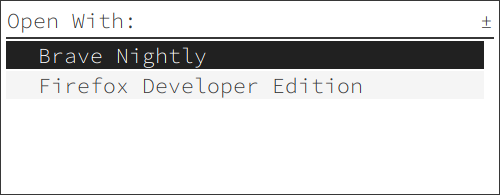
handlr-regex
Manage your default applications with ease using `handlr`! Now with the power of [regular expressions](#setting-regex-handlers)!
Fork of the original [handlr](https://github.com/chmln/handlr)
## Features
- Set default handler by extension or mime-type
- Set arbitrary commands as handlers based on regular expressions
- Intelligent mime type detection from files based on extension and content
- Open multiple files at once
- Set multiple handlers for mime/extension and use `rofi`/`dmenu` to pick one
- Optional wildcard support like `text/*`
- Automatically removes invalid/wrong `.desktop` entries from `mimeapps.list`
- Helper commands like `launch`, `get --json`, `mime --json` for your scripting needs
- Unnecessarily fast (written in Rust)
- Single compiled binary with no dependencies
## Usage
```sh
# Open a file/URL
handlr open ~/.dotfiles/pacman/packages.txt
handlr open https://google.ca
# Set default handler for png files
handlr set .png feh.desktop
# Set wildcard handler for all text files
handlr set 'text/*' nvim.desktop
# Set wildcard handler for all OpenDocument formats
# NOTE: startcenter.desktop is usually LibreOffice's main desktop entry
handlr set 'application/vnd.oasis.opendocument.*' startcenter.desktop
# Set default handler based on mime
handlr set application/pdf evince.desktop
# List default apps
handlr list
# Get the handler for a mime/extension
$ handlr get .png
feh.desktop
# Launch a handler with given path/URL
handlr launch x-scheme-handler/https -- https://google.ca
# Get the mimetypes of given paths/URLs
handlr mime https://duckduckgo.com . README.md
```
## Compared to `xdg-utils`
- Can open multiple files/URLs at once
- Can have multiple handlers and use rofi/dmenu to pick one at runtime
- Far easier to use with simple commands like `get`, `set`, `list`
- Can operate on extensions, **no need to look up or remember mime types**
- useful for common tasks like setting a handler for png/docx/etc files
- Superb autocomplete (currently fish, zsh and bash), including mimes, extensions, and `.desktop` files
- Optional json output for scripting
- Properly supports `Terminal=true` entries
## Setting default terminal
Unfortunately, there isn't an XDG spec and thus a standardized way for `handlr` to get your default terminal emulator to run `Terminal=true` desktop entries. There was a proposal floating around a few years ago to use `x-scheme-handler/terminal` for this purpose. It seems to me the least worst option, compared to handling quirks of N+1 distros or using a handlr-specific config option.
Now if `x-scheme-handler/terminal` is present, `handlr` will use it.
Otherwise, `handlr` will find an app with `TerminalEmulator` category and use it instead.
On the upside, `Terminal=true` entries will now work outside of interactive terminals, unlike `xdg-utils`.
> [!NOTE]
> For `handlr-regex` v0.11.2 and older, when `x-scheme-handler/terminal` is not present, this process is used instead:
>
> 1. Find an app with `TerminalEmulator` category
> 2. Set it as the default for `x-scheme-handler/terminal`
> 3. Send you a notification to let you know it guessed your terminal and provide instructions to change it if necessary
>
> This was changed in order to match how other mimetypes are handled and also so that `mimeapps.list` is not edited without the user's permission.
### Terminal emulator compatibility
`handlr` should work with pretty much any terminal emulator.
However, some slight configuration may be necessary depending on what command line arguments your terminal emulator supports or required to directly run a command in it.
If it uses/supports `-e` (i.e. `xterm`, `xfce4-terminal`, `foot`, etc.) then you do not need to do anything.
If it requires something else, then set `term_exec_args` in `~/.config/handlr/handlr.toml` to the necessary arguments like so:
```
// Replace 'run' with whatever arguments you need
term_exec_args = 'run'
```
If it does not require any arguments or if its arguments are already included in its .desktop file, but it does not use `-e`, (i.e. `wezterm`, `kitty`, etc.) set `term_exec_args` to `''`.
Feel free to open an issue or pull request if there's a better way to handle this.
## Setting multiple handlers
1) Open `~/.config/handlr/handlr.toml` and set `enable_selector = true`. Optionally, you can also tweak the `selector` to your selector command (using e.g. rofi or dmenu).
2) Add a second/third/whatever handler using `handlr add`, for example
```
handlr add x-scheme-handler/https firefox-developer-edition.desktop
```
3) Now in this example when you open a URL, you will be prompted to select the desired application.

## Setting regex handlers
Inspired by a similar feature in [mimeo](https://xyne.dev/projects/mimeo/)
Open `~/.config/handlr/handlr.toml` and add something like this:
```
[[handlers]]
exec = "freetube %u" # Uses desktop entry field codes
terminal = false # Set to true for terminal apps, false for GUI apps (optional; defaults to false)
regexes = ['(https://)?(www\.)?youtu(be\.com|\.be)/*.'] # Use single-quote literal strings
```
For more information:
* [desktop entry field codes](https://specifications.freedesktop.org/desktop-entry-spec/desktop-entry-spec-latest.html#exec-variables)
* [regex reference](https://docs.rs/regex/latest/regex/#syntax)
## Smart table output
Starting with v0.10.0, commands with table output (i.e. `handlr list` and `handlr mime`) switch to outputting tab-separated values when piped for use with commands like `cut`.
## Optional wildcards
When `expand_wildcards` is set to `true` in `~/.config/handler/handlr.toml`, rather than wildcard mimes being saved directly to `mimeapps.list`, they will be expanded into all matching mimetypes.
This is off by default and will not automatically expand wildcards already present in `mimeapps.list` when enabled. Simply use `handlr remove` and `handlr add` to manually expand them.
In addition, regardless of settings, literal wildcards are preferred when using `handlr remove` and `handlr unset`. (e.g. When using `handlr remove text/*`, if `text/*` is present, it will be removed, but `text/plain`, etc. will not be.)
## Completion scripts
To generate a shell completion script, run `COMPLETE= handlr`, where `` is the name of the target shell (e.g. bash, zsh, fish, elvish, powershell, etc.). Note that this will only print it to stdout rather than creating a file or installing the script automatically.
If you usually install `handlr-regex` from your distribution's repository, and you are not involved with packaging it, you probably do not need to worry about this.
See [`clap_complete`'s documentation](https://docs.rs/clap_complete/latest/clap_complete/aot/enum.Shell.html) for the list of currently supported shells.
> [!NOTE]
> This currently relies on unstable features of the `clap_complete` crate and may potentially change in the future.
## Screenshots
## Installation
### Arch Linux
```sh
sudo pacman -S handlr-regex
```
Optionally, you can also use `handlr-regex` as a replacement for `xdg-open` by shadowing it with a script in `$HOME/.local/bin/` (or any other user-scoped `$PATH` directory). Use the following script as an example:
```sh
#!/bin/sh
handlr open "$@"
```
### Rust/Cargo
```sh
cargo install handlr-regex
```
### Binaries
1. Download the latest [release binary](https://github.com/Anomalocaridid/handlr/releases) and put it somewhere in `$PATH`
2. Download completions for fish:
```sh
curl https://raw.githubusercontent.com/Anomalocaridid/handlr/master/completions/handlr.fish --create-dirs -o ~/.config/fish/completions/handlr.fish
```
## Attribution
Icons made by Eucalyp from www.flaticon.com
Cover photo by [creativebloq.com](https://creativebloq.com)



